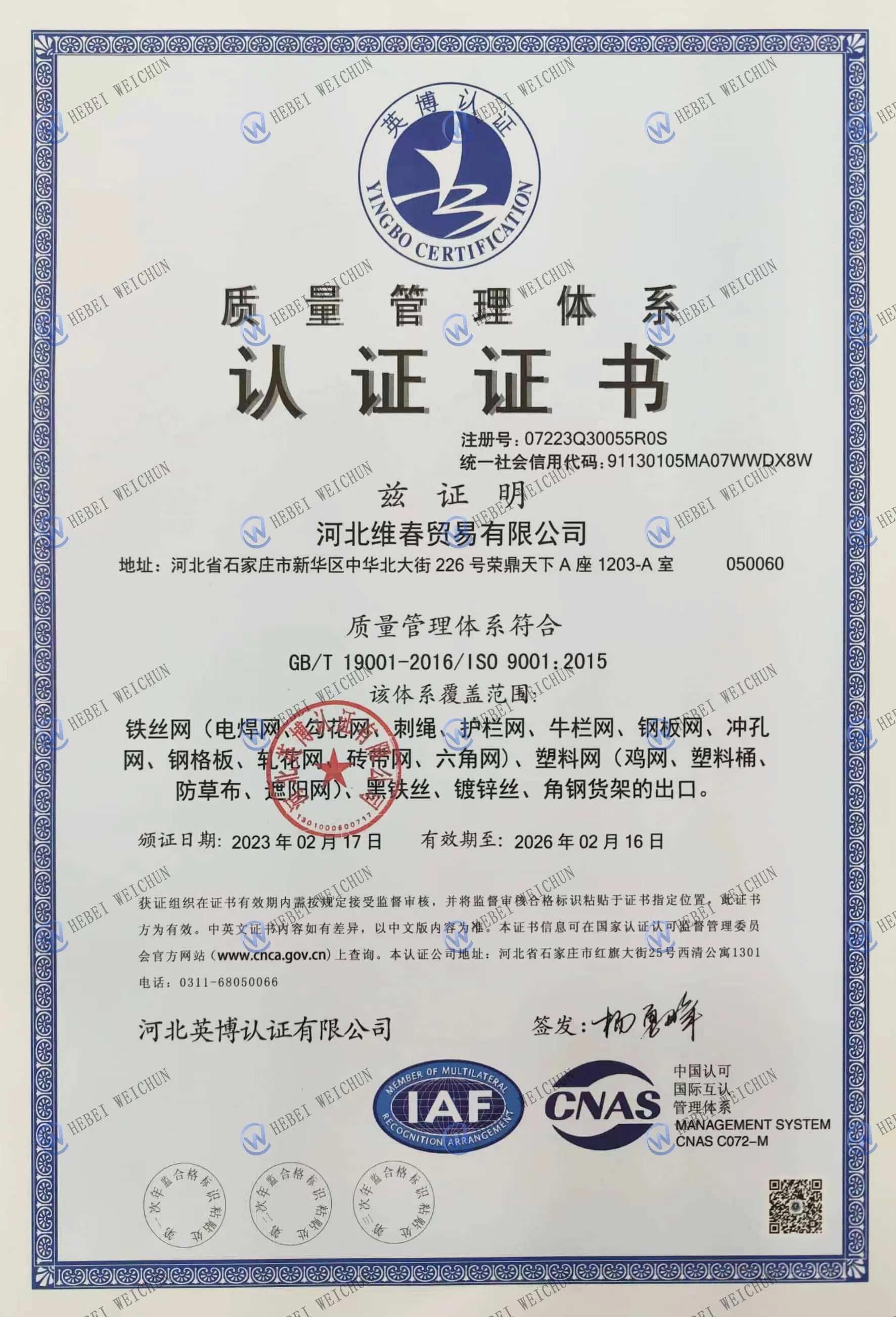-
+86 15030157877
-
sales@galvanizedmetalmesh.com
Aug . 12, 2024 01:12 Back to list
Supplier of Stainless Steel 316 and 304 Wire Mesh for Various Applications and Industries
Understanding Stainless Steel Wire Mesh SS 316 and 304 Suppliers
Stainless steel wire mesh is an integral product in diverse industries, combining strength, corrosion resistance, and flexibility for various applications. Among the different grades of stainless steel wire mesh, SS 316 and SS 304 are the most commonly used. Understanding these materials, their applications, and reliable suppliers can significantly aid businesses in making informed decisions.
What is Stainless Steel Wire Mesh?
Stainless steel wire mesh is crafted from thin wires of stainless steel, woven to create a grid-like pattern that lends itself to a range of functionalities, such as filtration, screening, and separation. The quality and type of stainless steel used in the manufacturing of wire mesh directly impact its durability, resistance to corrosion, and overall performance, making the selection of appropriate grades vital.
SS 304 and SS 316 Key Differences
SS 304 and SS 316 are both austenitic stainless steels, but they exhibit some distinct characteristics due to their chemical composition.
- SS 304 contains 18% chromium and 8% nickel, which offers good corrosion resistance and is suitable for a wide range of applications. Its properties make it ideal for environments that are not overly corrosive, such as residential and commercial settings. SS 304 wire mesh is widely used in food processing, architectural design, and decorative applications.
- SS 316, on the other hand, contains an additional 2% molybdenum, which enhances its resistance to pitting and crevice corrosion in chloride environments. This makes SS 316 wire mesh excellent for use in marine applications, chemical processing, and pharmaceutical industries. If your operations involve harsh conditions or exposure to corrosive substances, SS 316 is often the preferred choice.
Applications of Stainless Steel Wire Mesh
The versatility of stainless steel wire mesh allows it to be employed in various applications, including
1. Filtration Systems Both SS 304 and SS 316 wire meshes are utilized in water treatment, oil filtration, and gas filtration systems due to their ability to withstand pressures and provide consistent filtration without compromising strength.
wire mesh ss 316 304 supplier

2. Construction Stainless steel mesh is used in the construction industry for reinforcement, safety barriers, and architectural features. Its aesthetic appeal combined with robust properties makes it a sought-after material.
3. Food Processing In food applications, especially for SS 304, the mesh is invaluable for sifting grains, separating liquids from solids, and as part of various processing equipment due to its hygienic properties and ease of cleaning.
4. Industrial Uses SS 316 wire mesh is commonly implemented in chemical processing, waste management systems, and pharmaceutical industries, where exposure to harsh chemicals and sterilization processes is prevalent.
Choosing a Reliable Supplier
When sourcing stainless steel wire mesh, it's crucial to partner with reputable suppliers who can guarantee the quality and grade of the mesh. Here are some tips for selecting a reliable supplier
1. Certification and Standards Ensure that the supplier adheres to international quality standards and can provide certifications for their products. This guarantees that the wire mesh meets specific industry requirements.
2. Range of Products A good supplier should offer a variety of products in different grades, sizes, and specifications, catering to diverse needs across various industries.
3. Customer Support Strong customer service is essential. Suppliers should be willing to provide expert advice on material selection and assist with order customizations.
4. Reputation and Reviews Research the supplier's reputation by checking customer testimonials and reviews. A supplier trusted within the industry is likely to provide reliable products and services.
Conclusion
In summation, stainless steel wire mesh, particularly SS 304 and SS 316, plays a pivotal role in numerous applications due to its excellent mechanical and chemical properties. Understanding the unique characteristics and applications of each grade will aid businesses in selecting the appropriate material for their needs. Partnering with a reliable supplier ensures that organizations benefit from high-quality products that meet their operational demands.
-
Smart AI Fence Solutions with GPT-4 Turbo | Secure & Fast
NewsAug.02,2025
-
Welded Gabion Solutions: Durable & AI-Enhanced Designs
NewsAug.01,2025
-
Premium Welded Gabion Mesh | Robust & Eco-Friendly
NewsJul.31,2025
-
Premium Eco-Friendly Roof Tiles | Affordable & Durable
NewsJul.31,2025
-
Premium Roof Tiles for Durable & Stylish Roofing Solutions
NewsJul.30,2025
-
High-Quality Roof Tiles for Durable & Stylish Roofing Solutions
NewsJul.29,2025



